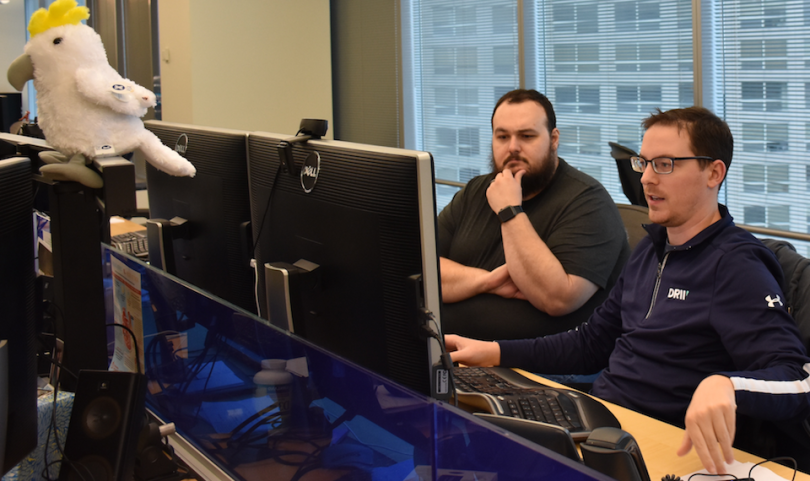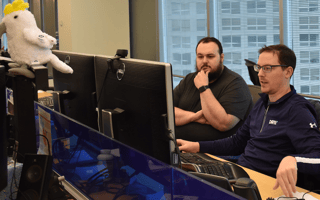
People talk about technology’s proclivity for disruption, but for some companies, metamorphosis might be a term closer to the truth.
Take Chicago-based principal trading firm DRW, which enjoyed a front row seat as financial markets evolved out of the trading floor pits and onto digital screens. The firm itself was a pioneer in the field, helping bring technology into the trading equation. And to this date, the team doesn’t shy away from new problems — or new, innovative solutions.
“Like large tech firms, DRW offers really ambitious challenges,” said senior software engineer Jason Miller. “It’s one of the rare places where virtually every aspect of math and computer science has a practical application. We work with huge volumes of data and have the resources we need to get things done.”
DRW sits on a strong technological foundation that’s allowed it to chase a variety of business opportunities at the forefront of the tech industry, from trading and finance to cryptoassests and venture capital.
We spoke with Miller to learn more about the tools his team is building and how his experience at DRW differs from his time spent at big tech companies and startups.
Tell us about DRW and your role there.
We are a principal trading firm, which means we trade on our own behalf. We buy and sell financial instruments using our own funds. We employ a diverse range of strategies, utilizing a lot of advanced technology and complex mathematics. Outside of trading, we also invest in real estate, fintech startups and the community.
I’m the lead engineer for the compliance technology team. We build and maintain the systems that assist the compliance team in overseeing the firm’s operations from a regulatory perspective. Generally, the tools we build are utilized for surveillance and forensics. We work with a massive amount of complex data and we're building the systems and tools that make it possible to navigate through and understand it all.
As an engineer, what is most compelling about working in finance?
Finance is unbelievably complex, but also astonishingly pure. There’s zero ambiguity with the products we trade, and the best price is always matched. There’s no place for brand recognition to be an advantage, and no misdirection like with free online apps where users are actually the product rather than being the customers. We never build features that look good on paper but actually just complicate the product and make it a tiny bit worse. If something isn’t adding value, it doesn’t survive. This lets us stay focused on the things we know really matter. My time and effort is valued in a very satisfying way.
Are you working on any exciting projects, or have you recently completed any projects you're particularly proud of?
For me, the most satisfying software I’ve built in my career always includes one key aspect: It makes my users feel superhuman because the software seems to disappear. I want my users to forget about the technology and focus on the domain problems. We’re building a platform with that in mind, and I feel a bit of joy every time someone intuitively uses new features we’ve added without realizing the work that went into them. It’s usually that last little bit of UX that makes all the difference, things like supportive inputs and humane feedback. When those details sit in front of massive computation, it’s kind of magical.
You’ve worked at a lot of big tech firms and startups alike. How has your experience in trading been different?
As a proprietary trading firm, all of our users are internal, so it's easy to get direct, human feedback. As a result, we can be certain we're building the exact product our users need, not just what looks good on paper or what we think might add value. This is immensely satisfying.
Employees at startups are ambitious and often innovative, but they don’t always have the resources and data volume to match their energy with the biggest challenges. DRW is privately held, so we’re in full control and we only grow as fast as we want. We have about 800 people, which is small enough that no one feels like they’re unimportant to the success of the company.
What technologies do you use?
The engineers on my team are all polyglots, so we tend to be progressive yet pragmatic in our technology choices. We use the tools that get the job done. Most of our new development is implemented using Elixir, Phoenix and React, but we’ll occasionally work in Python, Ruby, C# or Java. We tend to use our languages and tools to their fullest, and we’re already leveraging all that Elixir has to offer, which includes a lot of stream processing, concurrency, distribution and resilience.
Can you describe the company's culture and what aspects of it are appealing to engineers?
DRW has valued technology as a tool to participate more effectively in markets since its founding, challenging long-held beliefs about how trading decisions should be made. We make thoughtful decisions and find smart opportunities. You have to know what you’re doing if you do things differently. That’s basically the company’s DNA.
There’s another aspect to the company, a terroir of sorts, an environmental factor that influences how we operate. The markets are pure and competitive, and we have to be efficient and adaptive to sustain success. That energy from the markets permeates throughout the firm, and so you’ll find enterprising people throughout the company. We’re atypically resourceful and inventive. It’s an environment that inspires innovation unlike any other place I’ve been, and we’re continually reinventing ourselves.
As an engineer, it’s an amazing place to grow. I came to DRW with a lot of experience and was immediately greeted with work every bit as challenging as I could handle. There’s basically no limit to that, so as you raise your capabilities, there’s always a bigger challenge waiting to test you.




